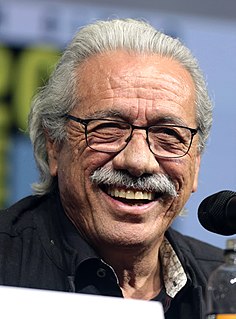A Quote by Kenneth M. Pollack
The real concern is that Iran would do what Pakistan did. Pakistan wanted nuclear weapons, like Iran, purely for defensive reasons - to defend itself against India. The problem was that once Pakistan acquired the weapons, it allowed the country to be more aggressive. So they stepped up their support for the Kashmiri terrorists, and it led very quickly to the Kargil crisis in 2000, which almost sparked a nuclear war between India and Pakistan.
Quote Topics
Related Quotes
Pakistan always seems to have a lot of political complexities and political challenges. But Pakistan is important for a number of reasons. Primarily, it is a nuclear power. And if, in fact, al Qaeda and Taliban, which are in Pakistan and causing a lot of tragedies and deaths in Pakistan - if they would ever somehow have real influence and control of that government, then we [world] really have a problem.
So the idea about how detonation of a nuclear weapon might happen vary, you know - some people are especially concerned about terrorists getting their hands on nuclear weapons and using them. Some people are worried that there might be a nuclear war between India and Pakistan. Some think the Middle East, were Israel already has nuclear weapons and where other countries may be interested at some point and acquiring them, might be a flash point.
Yes, I think lots of people are eager to obtain weapons of mass destruction. But there's no evidence that he has weapons of mass destruction. There's been no evidence of him testing nuclear weapons.
We have people that are in our face with nuclear weapons. We've got Iran and North Korea. We've got a problem with Pakistan. You know, I don't know what to say about that.
There's a whole lot of people that are going nuclear. And I think that Saddam Hussein is actually, with the evidence, the least able to use nuclear weapons and the least obvious offender in that area at this moment.
The list of American grievances is long: Pakistan developed nuclear weapons while promising the United States that it would not; the United States helped arm and train Mujahideen against the Soviets during the 1980s, but Pakistan chose to keep these militants well armed and sufficiently funded even after the Soviet withdrawal in 1989; and, from the American perspective, Pakistan's crackdown on terrorist groups, particularly after 9/11, has been halfhearted at best.
The animosity between India and Pakistan is deeply unfortunate and dangerous, and it's something I've long campaigned to reduce. But right now, when there's artillery being exchanged in Kashmir - which is not for from here, either - and there are 100-ish nuclear weapons on each side of the border, there's never really been a case like this where two nuclear armed countries are happily shelling each other.
Pakistan is alarmed by the rising Indian influence in Afghanistan, and fears that an Afghanistan cleansed of the Taliban would be an Indian client state, thus sandwiching Pakistan between two hostile countries. The paranoia of Pakistan about India's supposed dark machinations should never be underestimated.
































